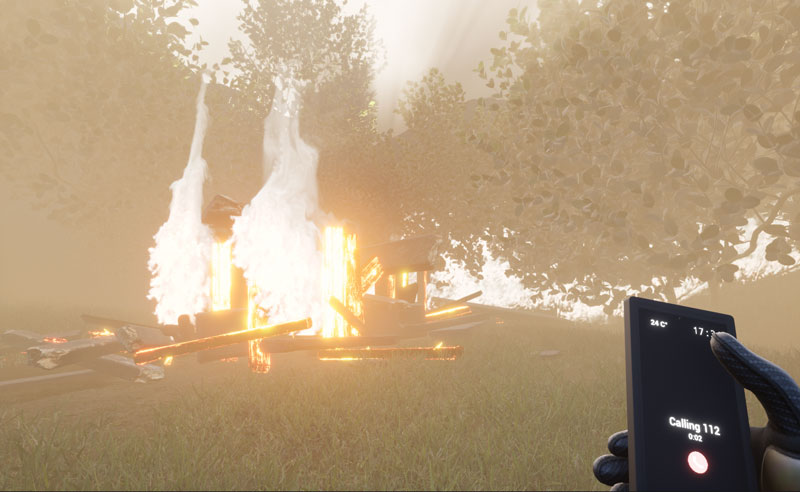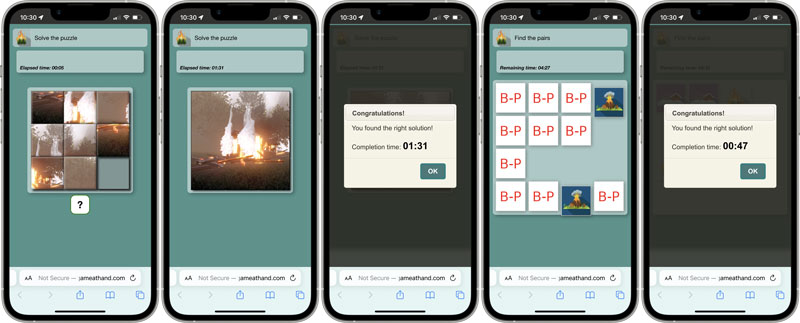by András L. Majdik (HUN-REN SZTAKI), Zoltán Székely (SFC), Anita Keszler, Zsolt László Márkus and Tamás Szirányi (HUN-REN SZTAKI)
In case of a disaster, “Plan A” is that first responders arrive and save everyone. But until then, everyone needs a “Plan B” to survive. B-PREPARED is an EU funded project, using virtual reality and gamification to teach disaster survival skills to European citizens via the medium of a mobile app (Project lifecycle: 2023-2026)
It is among the EU’s policy priorities to build “A resilient EU prepared for emerging threats” [1]. Europe has seen major floods, forest fires and heatwaves in the past decades. Between 1980 and 2020, natural disasters affected nearly 50 million people in the EU and caused, on average, an economic loss of €12 billion per year [2]. As a result of climate change, the intensity and frequency of disasters are expected to grow further. Therefore citizens’ awareness concerning the need for civic preparedness in disaster situations must be increased. However, large-scale drill practices require enormous financial and human resources, while entailing significant risks and severely limited potential scope. Effective delivery of quality information and knowledge about disaster response to a wider audience is an urgent requirement. Furthermore, with the change in media-consumption habits, information must be conveyed in a concise, joyful (game) form, with the help of digital platforms such as social media and smartphones. Lessons learned from the flood in Germany in 2021 showed that providing alerts to citizens is not enough to save lives, and the European Commission called for action to enhance citizen preparedness in the form of a Horizon Europe call for proposals.
A consortium responded to the call and submitted a proposal which scored maximum (15/15) points in the evaluation and was awarded with a grant. This consortium comprised 15 partners from 11 EU member states and associated countries across Europe from Ireland to Bulgaria, from Norway to Italy, coordinated by the Institute for Computer Science and Control (HUN-REN SZTAKI) in Hungary [L1], involving first responders, high-tech enterprises, research organisations and academia.
Innovation
There are learning materials and relevant information (facts and figures) available for the public (UN, EU and national states are all publishing such information) as well as information disseminating disaster alert apps. However, neither those solutions nor traditional information campaigns will significantly increase citizen preparedness with practical drills. They only provide general learning content instead of addressing specific needs, either location-based or situation-based.
The value proposition compared to the state-of-the-art lies in its holistic approach. Location-based and gamified mobile apps and VR serious games based on content created and supported by collaborative knowledge management platforms will provide an immersive and realistic experience like never before, at a level that no flat screen app, curriculum or multimedia can offer (Figure 1). Gaming behaviour has changed significantly since 2016, and mobile gaming (Figure 2) multiplied its player number (2.5 billion globally in 2020). VR headsets of Steam users went up exponentially from a few thousand to almost 4 million between 2016 and 2022 [3]. These channels have high potential in successfully delivering important learning content to European citizens or even globally.

Figure 1: Scene from a wildfire scenario in virtual reality for the B-prepared project.

Figure 2: Screenshot from gamified mobile app for the B-prepared project.
The concept of using a citizen-centric approach also means an extensive understanding of disaster and crisis. Scenarios and missions shall not only cover large-scale natural or man-made catastrophes affecting a lot of people, but individual-level crises as well, such as highway accidents, a stroke or getting lost in the mountains. It also includes training on how to help others in need, especially vulnerable groups such as pregnant women, elderly people, patients of chronic diseases and so on.
To cover this wide range, the project aims to offer a flexible gameplay with extendable, complex scenarios, where users (citizens, municipalities, first responders, schools) are enabled to add missions specific to their interest/professional experience and to create scenarios representing their environment with 3D modelling or Earth-observation techniques (e.g. UAV boarded cameras), or to use historical events that happened to them. For example, players can learn how to perform defibrillation or resuscitation, or cut-off electricity or open sluices to prevent flooding of an area, acquiring skills that previously needed on-site training or a drill but now can be used in virtual reality. Another feature is that players in different roles of mobile games with location-sensitive, preparedness-related content in digital walks can learn escape routes, shelter locations and safe zones in a geocaching-style gaming environment, which will be delivered to them in a location-sensitive way, focusing on their actual location.
The learning content also raises awareness and leads to a deeper understanding of the potential consequences of inaction and the importance of preventive measures, sustainable and circular economy, and more responsible individual behaviour in general. Disaster preparedness encourages people to think long-term and this mindset can foster a culture of sustainability and responsible decision-making.
Results will be disseminated in a wide range of forums including scientific and technical conferences and open access journal papers, mass media channels, information platforms and repositories. To demonstrate the linking of third-party apps and data sources, and to improve and build the platform with involvement of participants, events such as hackathons (two-day long software-developing social events) will be organised during the project.
The project consortium is open for collaboration and looking for stakeholders (individuals, companies, organisations) participating in disaster response or relief (including fundraising for victims), capable and interested in organising additional hackathons, joining the closed beta test or including B-prepared in their regular training, drills or exercises. Expressions of interest are welcomed through the contacts below.
Links:
[L1] https://cordis.europa.eu/project/id/101121134
[L2] http://www.b-prepared-project.com/
References:
[1] European Commission, Directorate-General for Research and Innovation, “Horizon Europe: strategic plan 2021-2024”, Publications Office of the European Union, 2021, https://data.europa.eu/doi/10.2777/083753
[2] European Commission, Directorate-General for European Civil Protection and Humanitarian Aid Operations (ECHO), “Overview of natural and man-made disaster risks the European Union may face: 2020 edition”, Publications Office, 2021, https://data.europa.eu/doi/10.2795/1521
[3] “Online Gaming in the U.S. and worldwide”, pp. 84, Statista, 2021, https://www.statista.com/study/15568/online-gaming-in-the-us-statista-dossier/
Please contact:
András Majdik
HUN-REN SZTAKI,
Zoltán Székely
Székely Family & Co. Non-profit Kft., Hungary











